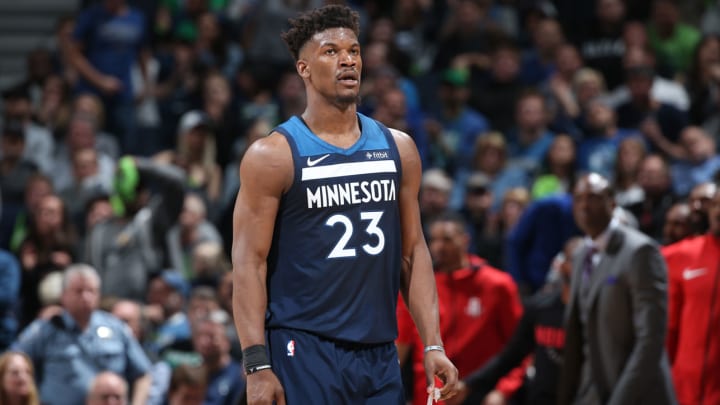The Timberwolves Keep Moving Forward

The Minnesota Timberwolves' season ended weeks ago, and in triumph. It was the night of their 47th win and the last gasp of the regular season—a momentous game pushed to overtime by the Denver Nuggets. The two teams had posted identical records through 81 games and identical scores after another four quarters with a playoff berth on the line. All the angst baked into Minnesota basketball came to bear. And when the moment came, every one of the Wolves' principal contributors had their moment.
Karl-Anthony Towns traded baskets with Nikola Jokic to keep the dream alive. Taj Gibson tracked Jokic to the corner at the end of regulation and stripped him before he could throw up even a fading, desperate attempt. Jeff Teague hit the go-ahead bucket in overtime, while Jimmy Butler steadied the ship. Andrew Wiggins stepped to the free throw line to hit the two biggest free throws of his life. The whole night was a dramatic, minute-perfect season finale—exactly what the franchise and fan base deserved after a 13-year postseason drought.
“We brought this organization and this city back where it needs to be," Butler announced in his walk-off interview, with MVP chants echoing through the Target Center and confetti strewn across the floor. The Timberwolves weaved through the crowd to offer consolation to their opponents. But when they found one another, they embraced.
What followed could only be anticlimactic. Both the Wolves and Nuggets knew what awaited them in the playoffs, should they qualify: A meeting with this season's most dominant team and its most unstoppable creator. This was not a series that Minnesota could win. Houston could pick them apart in too many ways and, when necessary, derail many of Minnesota's best scoring options. A Wolves defense that was flummoxed by the pick-and-roll all season would have to compete with an opponent who had maximized it. An offense sustained on two-pointers would have to keep pace with the most aggressive three-point shooting team in the league.
And so the series unfolded in predictable fashion—save that the Rockets didn't shoot well from beyond the arc and still finished the series in five games, capping it all with a 122-104 win on Wednesday night. Houston won by order of magnitude. One of these is a solid team, still in search of its best self. The other drops 50 points in a quarter just because it can. Minnesota was doomed the moment they drew this matchup, which really says more about Houston than anything else.
The Wolves, for their part, remain marked by the prospect that this collection of players should ultimately do better. This is both tantalizing and baffling; youth alone cannot explain the depths of Minnesota's defensive misery this season, just as imperfect chemistry doesn't adequately explain why the Wolves so often took themselves out of running their best stuff. One could rightly point to gaps in the rotation or issues in their approach. This team, like most, has its logistical issues. But there is nothing in basketball more obvious than when a team does not fully trust itself, and so much of Minnesota's play bubbles with doubt.
LeBron James Saves a Season on the Brink
It's in the glare Butler shoots at a teammate after a missed rotation. It's in the way Towns would slink to the corner early in this series, even when defended by an opposing guard. It's in Tom Thibodeau's near-permanent look of exasperation and Wiggins's flickering disengagement. There is too much talent in Minnesota for the Wolves to be anything but good, and yet their collective ability seems curbed a lack of conviction. Playoff teams can't afford to be both inflexible in approach and fickle in working toward their actual strengths.
Establishing that trust is the work of next season. These things take time. The Wolves have seen what they can do in fits and starts, and that alone was enough to position them as a home-court-advantage playoff team for much of the season. They won 47 games in spite of injuries to Butler, Teague, and Nemanja Bjelica. Minnesota's younger players are still learning what their contributions mean to a winning team, a process for which there is no crash course. Players learn by doing—and, in a sense, by losing. The Rockets were always an unfair point of comparison, but they became one because the Wolves are now good enough to meet them in the playoffs. Come next season, maybe they can be more.

Rob Mahoney is an NBA writer dedicated to the minutiae of the game of basketball, its overarching themes and everything in between. He joined the Sports Illustrated staff in 2012.